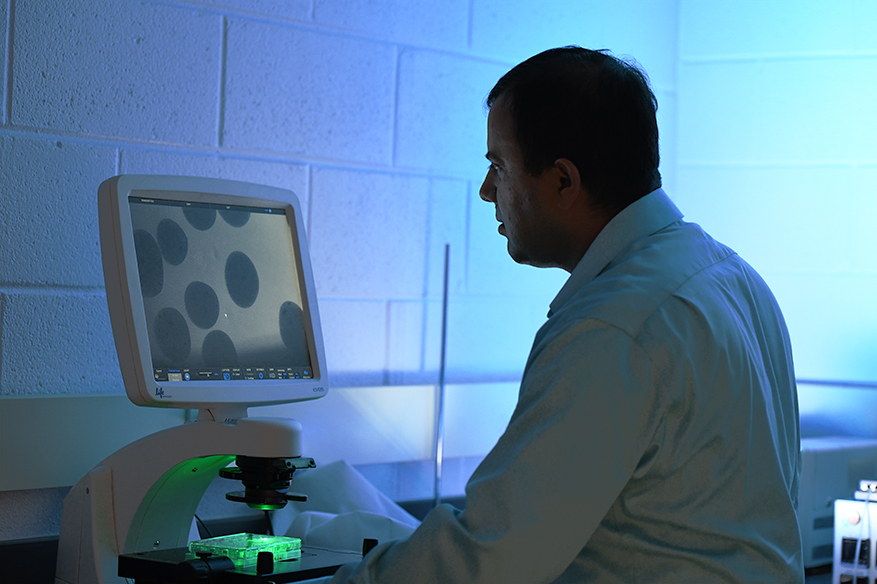
N.C. A&T Bioengineering Researcher Awarded $550K NSF Grant to Develop Biomaterials for Wound-Care Applications
By Alexander Saunders / 07/07/2021 College of Engineering
- 4-H and Youth Development News
- Academic Affairs News
- Accounting and Finance News
- Administration and Instructional Services News
- Admissions News
- Agribusiness, Applied Economics and Agriscience Education News
- Agricultural and Natural Resources News
- All News
- Alumni News
- Animal Sciences News
- Applied Engineering Technology News
- Athletics News
- Biology News
- Built Environment News
- Business and Finance News
- Business Education News
- CAES News
- CAHSS News
- Chancellor's Speaker Series
- Chancellors Town Hall Series
- Chemical, Biological, and Bio Engineering News
- Chemistry News
- Civil, Architectural and Environmental Engineering News
- COAACH News
- COE News
- COED News
- College News
- Community and Rural Development News
- Computational Science and Engineering News
- Computer Science News
- Computer Systems Technology News
- Cooperative Extension News
- COST News
- Counseling News
- Criminal Justice News
- Deese College News
- Economics News
- Educator Preparation News
- Electrical and Computer Engineering News
- Employees News
- Energy and Environmental Systems News
- English Department News
- Faculty News
- Family and Consumer Sciences News
- Graphic Design Technology News
- Hairston College News
- Headlines News
- History & Political Science News
- Honors College News
- Human Resources News
- Industrial and Systems Engineering News
- Information Technology Services News
- Innovation Station News
- Journalism & Mass Communication
- JSNN News
- Kinesiology News
- Leadership Studies and Adult Education News
- Liberal Studies News
- Library News
- Magazine News
- Management News
- Marketing News
- Mathematics News
- Mechanical Engineering News
- Media Spotlight News
- Natural Resources and Environmental Design News
- News Categories
- Nursing News
- Physics News
- Psychology News
- Research News
- Social Work News
- Staff News
- Strategic Partnerships and Economic Development News
- Student Affairs News
- Students News
- The Graduate College News
- Transportation & Supply Chain
- University Advancement News
- Visual & Performing Arts News
EAST GREENSBORO, NC (July 7, 2021) – The National Science Foundation (NSF) awarded a three-year $550,000 grant to Narayan Bhattarai, Ph.D., an associate professor of bioengineering at North Carolina Agricultural and Technical State University, to research metal-composite biomaterial that will significantly reduce the inflammation and scar formation of wounds, leading to more effective healing for patients. Bhattarai is the sole principal investigator on the grant titled, “Biodegradable Composite Nanofiber Meshes that Contain Degradable Metal Particulates.”
For metal implants that are used temporarily in the body for tissue repair, such as magnesium, zinc and calcium, sometimes too much of a good thing can be bad. As the metals degrade, their ions scatter uncontrollably to latch on to parts of the body not in need of the localized treatment, sometimes causing toxicity and other unwanted side effects. Bhattarai seeks to research the rate by which these helpful metal particles degrade in a physiological environment to develop a controlled treatment that delivers a proper dose of materials – not too much or too little.
“We have three goals in this research,” said Bhattarai. “First, we need to know the size, geometry and chemical composition of the particles in order to develop an appropriate composite mesh.”
The mesh is a combination of an FDA-approved bioresorbable polymer with metal particles that dissolve over time, supplying the healing properties of metal ions to the wound site.
 “Once we understand the rate of decay of these polymer-metals composite mesh, we can start testing these new structures to find out whether they can activate an immune response and trigger regenerative wound healing,” said Bhattarai.
“Once we understand the rate of decay of these polymer-metals composite mesh, we can start testing these new structures to find out whether they can activate an immune response and trigger regenerative wound healing,” said Bhattarai.
For this research, Bhattarai will test the biodegradable mesh covered with metal particles by exposing it to cells in in vitro – cells which are safe to test because they are not part of a living organism – to study if they are sufficiently reducing fibrotic responses and inflammation.
The grant builds on Bhattarai’s earlier research and strong collaboration through the funding support from Department of Defense of the Army and NSF Engineering Research Center (ERC) for Revolutionizing Metallic Biomaterials established on A&T’s campus. Through this infrastructure, Bhattarai has excelled at designing and developing a wide range of health-care biomaterials that mimic the nano- to micro-scale order found in nature.
In 2020, Bhattarai was recognized for being in the top 2% cited scientists internationally. He is one of the founding faculties of the bioengineering program at A&T. He has worked on grants issued by the NSF, Department of Defense and National Institutes of Health. He has presented research in numerous conferences sponsored by the Biomedical Engineering Society, Society for Biomaterials, the American Society of Mechanical Engineering and the American Society for Engineering Education. This year, Bhattarai will co-chair the 37th Southern Biomedical Engineering Conference 2021.
The project supports one graduate research assistant and two biomedical engineering undergraduate research assistants. During the summer, Bhattarai plans to hire a local high school teacher to get hands-on experience in a lab at A&T to conduct research, learn about engineering and develop a course model to teach to students.
Jagannathan Sankar, Ph.D., ERC director and distinguished professor in the Department of Mechanical Engineering, will serve as senior personnel on the project. Sankar will serve as an advisor to assist in fabrication and characterizing magnesium and zinc particles and to work with the educational component of the project.
Media Contact Information: uncomm@ncat.edu



